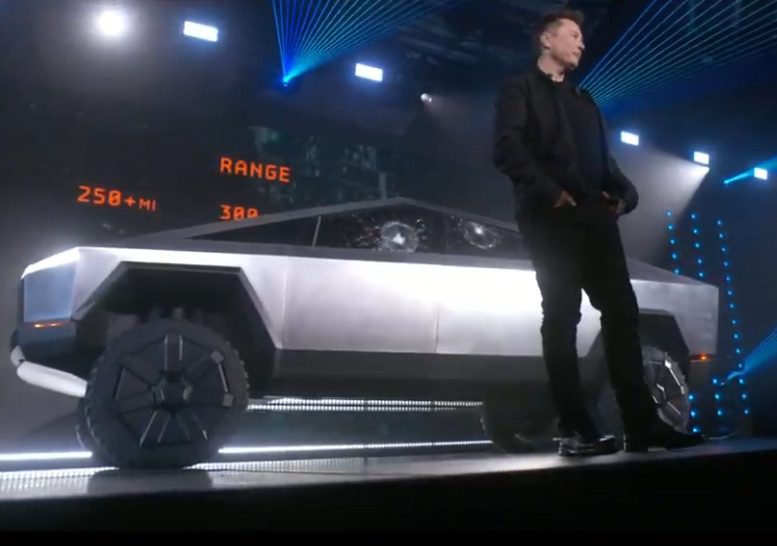CEO and co-founder Elon Musk says that Tesla’s Maxwell Technologies acquisition is an “important piece of the puzzle” to the company meeting demand for the “bad-ass futuristic” Cybertruck and continuing a ramp up of electric vehicle production.
At Tesla’s fourth quarter earnings call this morning (Australian time), Musk highlighted the “wild” demand for the polarising and innovative Cybertruck which stunned crowds when it was unveiled in November.
In the week following the Tesla Cybertruck launch, pre-orders quickly exceeded $US25 million ($A37 million) as customers flocked to secure a position in the reservation queue for a refundable $US100 ($A150 in Australia) fee.
Musk says that the demand is so high that it could take Tesla 3-4 years to clear the backlog of demand for the Cybertruck, which he described as the “most bad-ass futuristic armoured personnel carrier”.
“I think we will sell as many as we can make for many years,” he said, adding that many people did not realise just how good the Cybertruck would be.
“It is better than people realize even,” Musk said. “They don’t have enough information to realize the awesomeness of it. It’s just great.”
Musk would not be drawn on how many Cybertrucks he thinks Tesla can make, instead outlining the importance of a ramp up of battery production to meet demand, not only for the Cybertruck but also for Tesla’s other electric cars.
“Demand is far more than we can reasonably make in the space of 3-4 years,” he said.
“The thing we are going to be really focussed on is increasing battery production capacity, because that’s very fundamental.
“If we don’t improve battery production capacity then we just end up shifting volume from on one product to another and you don’t end up making more electric vehicles.
“That’s why we’re not really accelerating production of the Tesla Semi because it does use a lot of cells. And unless we get a lot of battery cells available, accelerated production of the Semi would mean making fewer Model 3 and Model Y cells.
“Unless we get a very steep ramp of battery production and continue to improve the cost per kilowatt hour of the batteries. This is fundamental and extremely difficult.”
Key to this it appears will now be the Maxwell Technologies, which was acquired in May 2019 by Tesla and is known for its development of ultracapacitors and dry cell technology.
The acquisition has sparked a great deal of speculation on whether it would be Maxwell’s ultracapacitor technology, which could give Tesla an advantage in battery charging speed if limitations of energy density have been overcome, or dry cell technology which could help Tesla to increase battery energy density, that Tesla chooses to leverage.
Musk’s repeated comments on the importance improving cost per kilowatt hour are a hint that the latter could be the case.
However Musk would not give more details on the matter, only saying that the Maxwell acquisition “is an important piece of the puzzle” and it would be discussed on the upcoming Battery Day that will now most likely occur after the first quarter of 2020.
“A lot of these questions wlil be answered. I think it’s going to be a very compelling story that we are going to present, it’s going to blow people’s mind. It blows my mind, and I know it. It’s going to be pretty cool,” he said.

Bridie Schmidt is associate editor for The Driven, sister site of Renew Economy. She has been writing about electric vehicles since 2018, and has a keen interest in the role that zero-emissions transport has to play in sustainability. She has participated in podcasts such as Download This Show with Marc Fennell and Shirtloads of Science with Karl Kruszelnicki and is co-organiser of the Northern Rivers Electric Vehicle Forum. Bridie also owns a Tesla Model Y and has it available for hire on evee.com.au.

